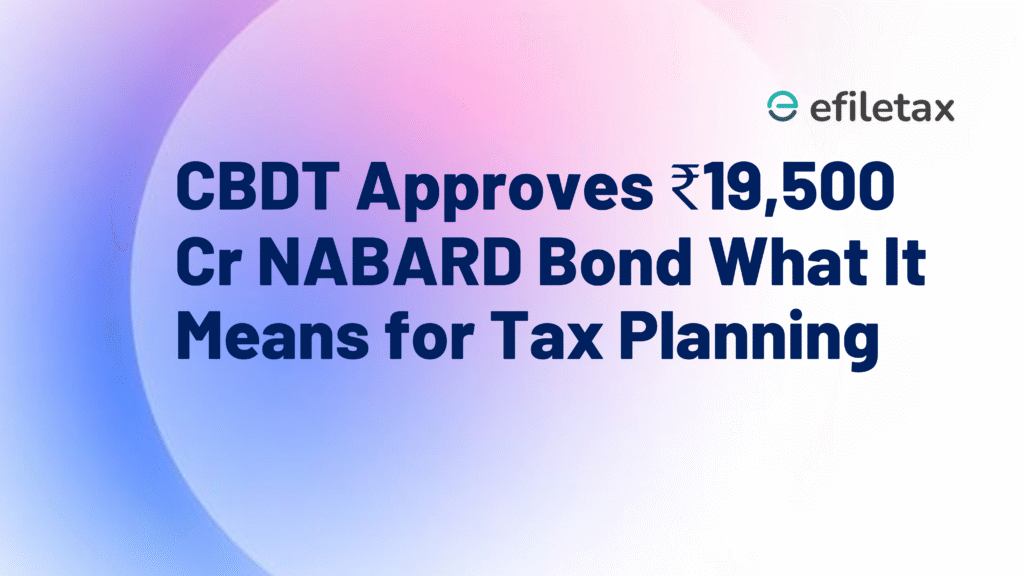
NABARD Zero Coupon Bond Tax Notification What You Must Know
In a recent update, CBDT notified NABARD Zero Coupon Bond worth ₹19,500 crore under the Income-tax Act, 1961. This move falls under Section 10(15)(iv)(h), making these bonds eligible for income tax exemption on interest. Here’s a simple breakdown of what this means for taxpayers and investors.
What Are NABARD Zero Coupon Bonds?
- Issued by: National Bank for Agriculture and Rural Development (NABARD)
- Type: Zero Coupon Bonds – issued at a discount and redeemable at face value
- Amount: ₹19,500 crore
- Tenure: Typically long-term
- Interest: No periodic interest payout; returns generated from the difference between issue price and redemption value
CBDT Notification Highlights
- Notification No. 40/2025, dated 29.04.2025
- Issued under: Section 10(15)(iv)(h) of the Income-tax Act
- Purpose: Recognising NABARD Zero Coupon Bonds for tax-free interest income
📄 Read the official notification here (incometaxindia.gov.in)
Tax Benefits Under Section 10(15)(iv)(h)
| Particulars | Benefit |
|---|---|
| Applicability | Recognised institutions as per GOI notifications |
| Interest Taxability | Fully exempt under Section 10(15)(iv)(h) |
| Capital Gain on Sale | Taxable if sold before maturity |
| Transferability | Generally not transferable; held to maturity |
| Suitable For | Institutional investors, long-term social development investments |
Why This Matters for Indian Investors
- Tax-Free Return: Interest income from these bonds is exempt
- Government-Backed Security: High credit safety through NABARD
- Development Impact: Funds will aid rural infrastructure and agriculture finance
- Portfolio Diversification: Useful for long-term institutional investors (e.g., PF trusts)
Legal Reference: Section 10(15)(iv)(h)
This section exempts interest on certain specified bonds issued by government institutions. CBDT issues periodic notifications specifying eligible bonds. The NABARD ₹19,500 Cr issue is now officially included.
Note: Exemption applies only if bonds are held to maturity and not transferred or traded.
Expert View: Key Compliance Tip
“While the interest income is exempt, investors must maintain documentation proving bond ownership and tenure till maturity, especially during tax assessments.”
— CA Ramesh Gupta, Partner, AGT & Co.
FAQs
Q1. Who can invest in these NABARD bonds?
A: Primarily institutional investors such as banks, insurance companies, and pension funds.
Q2. Is there any TDS on these bonds?
A: No TDS on interest, as income is exempt under Section 10(15)(iv)(h).
Q3. Are these bonds listed or tradable?
A: Typically, such government-specified zero coupon bonds are non-tradable and held till maturity.
Final Thoughts
The CBDT’s recognition of NABARD’s ₹19,500 Cr zero coupon bond as tax-exempt is a significant policy signal. It boosts infrastructure funding and offers tax-efficient options to large investors. As always, consult your tax advisor before investing.
Need help with tax exemptions or investment documentation?
Talk to experts at Efiletax.in — your trusted compliance partner for tax filing, investment declarations, and Section 10 guidance.
Summary
CBDT notifies NABARD Zero Coupon Bond worth ₹19,500 crore under Section 10(15)(iv)(h), granting full tax exemption on interest income. Learn how this impacts long-term investors and rural infrastructure funding.